Assaults on Iran's Baha'i Community Intensify
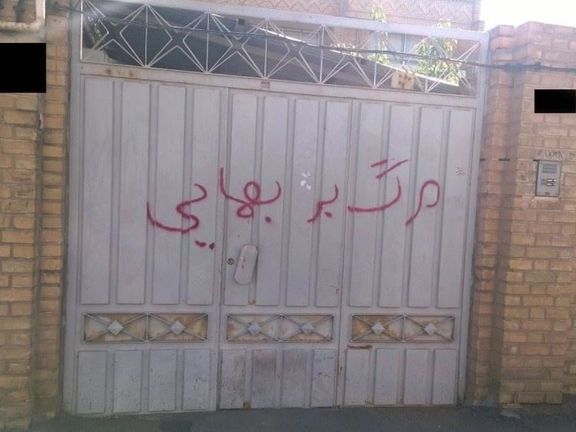
Armed Iranian security agents raided the homes of at least 30 Baha'is in the cities of Karaj and Hamedan this week, with at least 20 taken into custody.

Armed Iranian security agents raided the homes of at least 30 Baha'is in the cities of Karaj and Hamedan this week, with at least 20 taken into custody.
From Iran International reports, the members of the minority group, one of the most persecuted in Iran, endured verbal abuse and physical assault during the raids.
Last month, another ten Baha'is, all women, were arrested in Esfahan (Isfahan), while 26 others faced severe sentences totaling 126 years in prison. A disturbing trend has seen at least 32 individuals detained across various cities in the country in the past month.
Homes housing five elderly women aged between 70 and 90 in Hamedan were subjected to raids. One of these women, grappling with Alzheimer's disease, was rushed to the ICU in distress following the assault. In a separate incident, the door of an 82-year-old woman's home was forcibly broken, her belongings upended, and her residence damaged in her absence.
The husbands of two of these women were among the more than 200 Baha'is executed by Iran's government in the aftermath of the 1979 Islamic Revolution. Details on charges against the detained Baha'is and their current locations remain elusive.
In September, a statement from the Baha'i community in America revealed the ongoing suppression of Baha'is in Iran. The release disclosed the detention of 60 individuals and the seizure of properties belonging to 59 other Baha'is. Despite unofficial estimates indicating the presence of over 300,000 Baha'i citizens in Iran, the country's constitution officially recognizes only Islam, Christianity, Judaism, and Zoroastrianism. The Baha'i is the largest non-Muslim religious minority, facing systematic persecution since the Islamic Revolution in 1979.
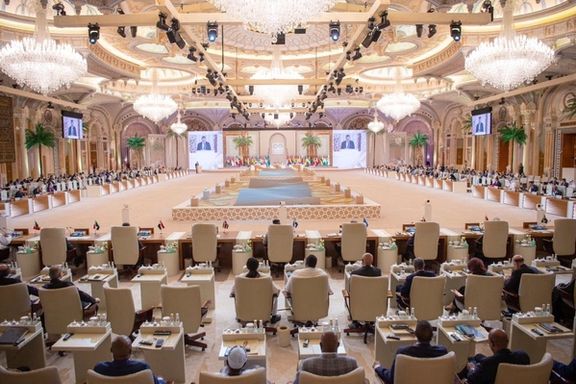
The Islamic-Arab summit in Riyadh was unanimous in slamming Israel, but the event laid bare some fundamental rifts between Iran and the Arab world on ‘Palestine.’
The joint summit of the Arab League and the Organization of Islamic Cooperation (OIC) in the Saudi capital, the biggest since the Hamas-Israel war started on October 7, took a tough tone against Israel. The final declaration on Saturday rejected Israeli claims that it is acting in "self-defense" and demanded that the United Nations Security Council adopt "a decisive and binding resolution" to halt Israel's "aggression." However, the practical measures pushed by Iran were ignored in the final communique.
Riyadh originally planned to host two separate extraordinary summits but then extended the Arab League summit to include the OIC, a wider association of 57 mostly Muslim-majority states to which the Arab League countries belong. Arab diplomats told AFP the decision to merge the meetings came after Arab League delegations failed to reach an agreement on a final statement. Iranian President Ebrahim Raisi's trip to Saudi Arabia was the first by an Islamic Republic’s head of state in more than a decade. It was enabled after Tehran and Riyadh formally ended years of hostility under a Chinese-brokered deal in March.
During the meeting, Iran pushed for punitive economic and political steps against Israel over its retaliatory offensive against Hamas but while the participants condemned Israeli forces' "barbaric" actions in Gaza, they declined to approve Tehran’s proposals, highlighting regional divisions over how to respond to the war as fears mount that it could spiral out in other countries. Common belief is that Iran, vocally opposed to warming ties between Israel and the Arab world, nudged Hamas with hundreds of millions of dollars as well as logistical support to start a war so the anti-Israeli sentiments would disrupt the peace process between Israel and the Arab world begun in 2020 with the Abraham Accords. Just weeks before the war broke out, the Saudi Crown Prince and de facto ruler, Mohammed bin Salman, admitted ties were getting ever closer between Israel and the kingdom.
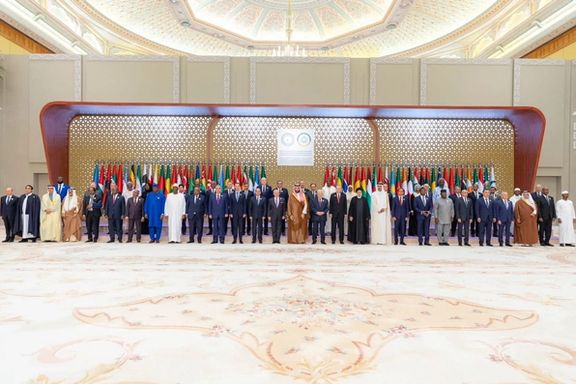
The Iran-funded militia Hamas attacked Israel on October 7 and killed 1,200 mostly civilians and took over 240 people as hostages. Israel has been pounding Hamas’s targets in Gaza for over a month now seeking to uproot the Islamist group, which has made the war exceedingly bloody, hiding deep among the civilian population and underneath the coastal sliver’s non-military facilities. The Iranian regime praised Hamas as soon as news about the attack emerged and immediately organized street celebrations. While it has refrained from direct involvement in the fighting, its Iraqi, Syrian and Yemeni proxy forces have launched more than 40 rocket and drone attacks against American forces in the region, not deterred by a large deployment of US naval forces in the region.
The leaders at the Riyadh summit called for an end to weapons sales to Israel and dismissed any future political resolution to the conflict that would keep Gaza separate from the West Bank. However, the call to cut already established ties with Israel, led by Algeria and spearheaded by Iran, was also rejected, at least by the United Arab Emirates and Bahrain, which normalized ties with Israel in 2020 under the Abraham Accords.
Another point raised by Tehran and rebuffed by Muslim leaders was on the Israeli military. Iran’s President Raisi urged Islamic nations to designate the Israeli army a "terrorist organization" for its conduct in Gaza. Israel blames Hamas for the high death toll, accusing it of using civilians as "human shields." The Hamas-run Health Ministry says over 11,000 have died so far.
Another salient difference between Iran’s stance and those of the Arab countries is the two-state solution. Arab countries insist on a solution based on the borders of June 4, 1967, with Jerusalem as its capital, but Iran insists that a Jewish state should not exist at all.
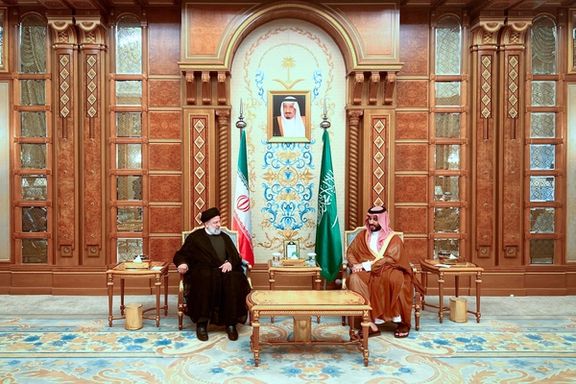
Upon arrival in Tehran, the Iranian president immediately reiterated the regime’s views and even the foreign ministry officially issued its list of “reservations” on the final statement of the summit. "These issues have also been conveyed through an official note by the Islamic Republic of Iran's representation in Jeddah to the Secretariat and will be reflected in the final report of the meeting," foreign ministry spokesman Naser Kanaani said Sunday.
The Islamic Jihad, another Iran-backed Palestinian militant group in Gaza, also issued a statement distancing themselves from the position taken by the Arab-Muslim summit. The group claimed that the final statement showed that all Arab and Islamic countries have abandoned “their duty to defend the national security of the Arab and Islamic world.”
All in all, this was the largest gathering of heads of state to sit under one roof with a common goal, ending the conflict between Israel and Palestinians. However, the question remains whether peace could even be a possibility as long as the Islamic Republic is present to sow discord and stand opposed to any diplomacy with Israel.
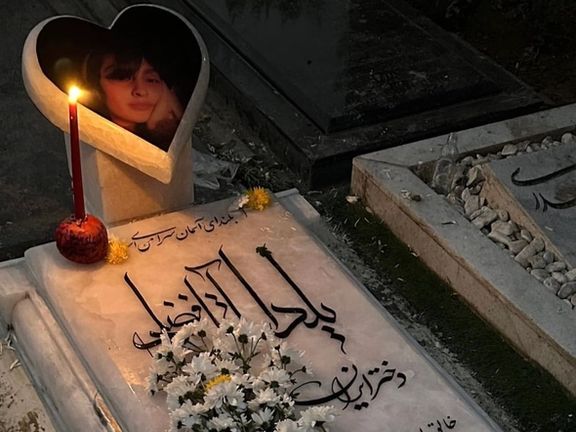
The father of one of the victims of the 2022 protests in Iran has disclosed that security forces summoned him and prohibited the commemoration event for his daughter.
Mehrdad Aghafazli, Yalda Aghafazli's father, shared on his Instagram post on Saturday night that after visiting the authorities, security forces explicitly stated, "You have no right to hold any ceremony." When he responded, expressing his intention to organize a private event, they reportedly asserted, "Even that is not your right."
Yalda Aghafazli, a 19-year-old protester, was detained during the October 26 demonstrations in Tehran. She went on a hunger strike to protest the prison conditions and was released without accepting any of her charges. However, a few days later, she died under suspicious circumstances, and her body was buried under strict security measures.
Aghafazli mentioned that security forces, implicitly threatening him, said, "We are watching you." In response, he told them, "I am glad you have been after me for a year. I am no longer afraid. My fear was for my daughter's life and future, which she lost. Now, my only fear is that you come and harm the people attending my daughter's ceremony. I apologize to their mothers and fathers."
The incident is the latest in a string of ceremonies banned by security forces over the years, and harassment and imprisonment of the families of activists dating back to the 1980s. It worsened after the death of Mahsa Amini last year. Additionally, families of slain protesters continue to be harrassed.
On the anniversary of the death of Javad Heydari, who was shot by security forces in the first wave of protests in September last year, agents arrested his brother and several other family members. His sister, Fatemeh, reported that security forces fired tear gas into their house as well as deploying troops to the village to quash any gatherings.

Iran's dire nursing shortage is now causing fatalities in hospitals as over 3,000 nurses leave the country annually.
Mohammad Sharifi Moghadam, the Secretary-General of the Nursing Association said "patients are dying due to the shortage of nurses." He emphasized the dissatisfaction among nurses, revealing that official statistics indicate over 90% of them are unhappy with their work, raising serious concerns about the quality of patient care.
The destinations for migrating nurses are predominantly Germany, the United States, Australia, and Canada. He highlighted the challenges of compensating for the loss of experienced and professional nursing staff, making it a daunting task.
Sharifi Moghadam recently reported a shortage of 70,000 nurses. Iran's leading economic daily Donyaye Eqtesad newspaper, in a May report, disclosed that over 10,000 doctors and nurses had left Iran in the previous year. Over the past four years, the country has witnessed the migration of 16,000 general practitioners.
Last week, the ILNA news agency reported that nurses receive a mere 2.4 to 3.1 dollars for each overtime hour, leading to increased dissatisfaction within the nursing community at a time when the country's economy is at its deepest crisis in decades.
Health system indicators suggest that there should be three nurses per thousand citizens or two nurses per hospital bed. Reports indicate that Iran's current ratio falls below half of the minimum health requirements, raising concerns about the adequacy of healthcare services.

An Iranian lawmaker has criticized an initiative to devise a 5-year development plan for Gaza, saying it is the responsibility of Palestinians, not Iranians.
MP for Chabahar, Moeinoddin Saeedi, told Roydad24 website in Tehran, “We have managed to complete only 20 percent of our own country's development plan and now they intend to write the first five-year development plan for Palestine as well.”
He went on say, "We must seek to solve the problems of our own country first. Our development programs have not been properly implemented and have failed to solve existing challenges."
Originally scheduled to end in 2021, Iran's sixth Five-Year National Development Plan has been extended until mid-2024. Even so, based on Parliament Research Center's analysis, so far just 30% of the plan was partially has been implemented, 40% remained untouched, and 30% could not be assessed. Yet, Saeedi said, the same organization has called for a developmental plan for Palestine since "Israel is approaching its last stage of collapse".
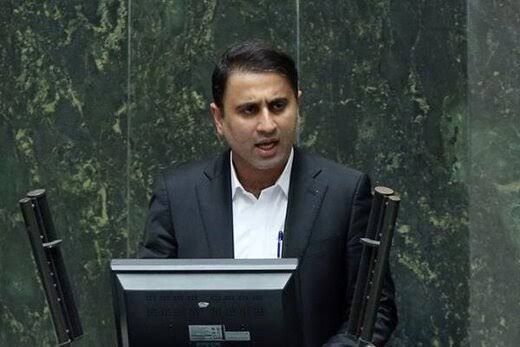
Since earlier this year, the Iranian regime has amplified its rhetoric heralding “an imminent collapse of the Zionist entity,” especially in the light of Israeli protests against Prime Minister Benjamin Netanyahu.
As part of its economic development, Iran devises multi-year plans as a guide for the executive branch and parliament, which is responsible for examining and approving the annual budget.
After over 18 months of delay, the seventh plan was finally presented to the parliament by the president Ebrahim Raisi earlier this year. Economists have called the plan a pointless bureaucratic exercise amid overall economic and political instability. In addition, lawmakers have expressed serious concerns about the plan's economic implications for the country, and despite making a number of changes, they have called it deficient.
Due to sanctions and growing corruption, Iranian governments have been unable to implement any meaningful development plans for more than a decade. Amid international isolation, Tehran has been highlighting its strategy to join non-Western blocs. However, even a former commander of the IRGC deemed the strategy of joining international organizations such as BRICS and SCO unproductive due to US sanctions.
There is also another significant plan called Iran's "Twenty-Year Vision Document", that essentially calls for Iran to be the leading nation in the region with regard to economic achievements by 2025, which is just two years away.
The question arises, however, why the regime is even entertaining the idea of helping Gaza’s development when they need the public’s vote for the upcoming Parliamentary elections in March. Even the conservatives have admitted that the general public lacks an appetite for the Palestinian cause.
Even a Holocaust denier such as former President Mahmoud Ahmadinejad has remained silent about the war in Gaza, refusing to repeat the regime’s talking points. His silence has led to state-controlled media repeatedly pressuring Ahmadinejad to say something.
Similarly, the leaders of the ultra-hardliner party Paydari have also remained generally silent on the war in Gaza.
As the regime actively refrains from assisting Hamas on the ground through the so-called Axis of Resistance, it appears as if it has two objectives in mind. First to send a message to Palestinians that although they are not providing much assistance at the present time, they will help during the post-war period with the rebuilding process, as well as hinting to others in the region that they are interested in remaining involved in the negotiations and participating in post-war decisions, a point that is further reinforced when Iran has been asked to participate at the summit in Saudi Arabia about the Gaza situation.
But the Iranian public remains very sensitive toward the issue of spending money on militant groups in other countries, when they have to endure a 50-percent annual inflation rate. The regime is also concerned about a wider war, which could involve the United States, with incalculable consequences.
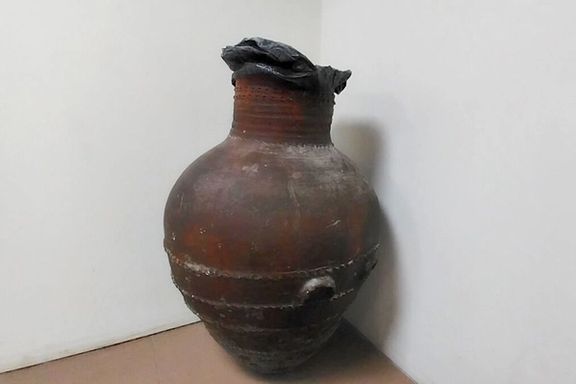
A clay jug dating back to the Medes period is now serving as a trash bin in a museum in Iran's Archaeological Museum of Rasht.
An official from the museum has claimed it is to prevent the potential theft of conventional wooden and plastic bins. Iran, celebrated for its millennia-old cultural heritage, encounters challenges in safeguarding such invaluable artifacts.
The neglect, insufficient maintenance, and environmental impacts on some historical sites and artifacts further intensify worries about the overall state of preservation.
The shift towards emphasizing Islamic culture since the 1979 Islamic Revolution has often led to a more conservative stance on pre-Islamic relics. The present Iranian regime appears hesitant to fully embrace its profound historical legacy, despite having once presided over the world's largest empire.
The development unfolds amid the backdrop of extensive collections of ancient Persian artifacts excavated by foreign archaeologists before the twentieth century.
The artifacts grace renowned museums worldwide, including the Louvre in Paris, the British Museum in London, the University of Chicago's Oriental Institute Museum, and the State Hermitage Museum in Saint Petersburg, all housing significant Persian antiquities.